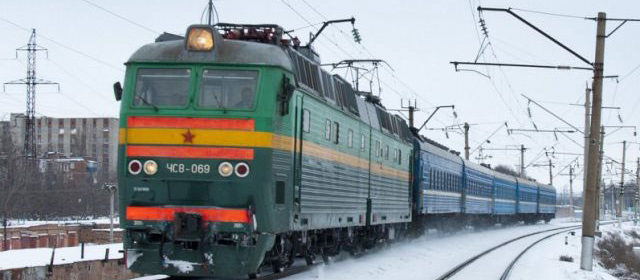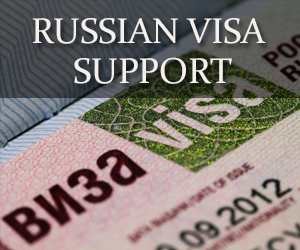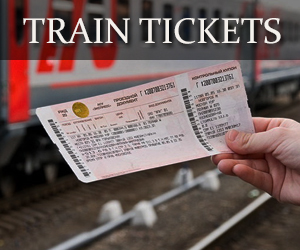Traveling by rail? Trains in Russia resources outline what to expect on your CIS rail journey.
- Introduction to Train Travel in Russia and the CIS
- How to Buy Train Tickets (online, help from a guide, on your own)
- Planning Your Trip on the Trans Siberian Railway
Introduction to Trains in Russia
There are 2 Types of Trains in Russia, Ukraine
- short distance elektrichki (электрички)
also called suburban trains (пригородные поезда) - long distance trains (междугородные поезда)
Long Distance Trains – 4 Classes of Compartments
- 1st Class (Sleeping Wagon) – (Спальный вагон)
First class (Russian abbreviation СВ, consists of two bunks in a locking compartment, occasionally with a TV and sink. - 2nd Class (Kupé) – (Купе)
Second class consists of four bunks (two top, two bottom) in a locking compartment. - 3rd Class – (Platzkart) – (Плацкарт)
Third class is an economy option consisting of six bunks in an open compartment (so you will have an abundance of neighbors). - 4th Class – “place to sit” – (Сидячее место)
Fourth class is super economy. It’s basically an open compartment similar to Platzkart, but you don’t get your own bunk or linen, just a “place to sit”.
Which Class Suits You Best?
- Want a good night’s sleep for work, perhaps a business meeting the next day. If so you are better off taking 1st or 2nd class. Bunks are a bit longer, and you only have to put up with a few neighbors.
- Do you want to socialize with Russians and/or Ukrainians? If you travel 2nd class (Kupé), perhaps you’ll meet some very friendly passengers. Then again, you might end up in a compartment with Russian businessmen who want to be left alone. When you travel 3rd class (Platzkart) on the other hand, you are in an open compartment, so everyone is your neighbor. Don’t be surprised when you are asked all kinds of questions, treated to fried chicken, boiled eggs, pickled tomatoes and cucumbers, and participate in several toasts over beverages like vodka and beer.
- Women traveling alone may find peace of mind traveling 3rd class, just to avoid the odd chance of being stuck in a 2nd class Kupé compartment with several strange (and possibly intoxicated) men.
- On the flip side, those traveling with lots of cash or valuables may consider 2nd class, since you have fewer neighbors and a lockable compartment.
Restrooms, Bedding, Food, Water and Smoking
- Trains in Russia have two restrooms per carriage (one on each end). Since waste is disposed directly onto the tracks, restrooms are locked roughly 10min before and 10min after each city. (Conductor will only open it for you if you absolutely can’t wait).
- Restrooms are generally equipped with a toilet, sink, mirror, soap and toilet paper. Showers are sometimes available, but only for 1st & 2nd class carriages on long distance trains. Electric shaver outlets are provided inside restrooms on 1st & 2nd class, outside of restrooms on 3rd class carriages.
- Due to the higher traffic on 3rd class carriages, lineups can be an issue in the morning and before the final destination. Conductors do their best to keep restrooms tidy, however cleanliness is sometimes an issue on 3rd class carriages which serve a high volume of passengers.
- Bedding is passed out in sealed packages by the conductor. Everyone must make their own bed (with the exception 1st class passengers). Bedding includes a top and bottom sheet, pillowcase and towel. Wool blankets are also available, either found on a top bunk or passed out by the conductor.
- Sometimes the price of bedding is already added to your ticket. On other occasions you pay directly to the conductor when she is collecting tickets at the start of your train journey (cost is no more that a couple of dollars). If you are not sure if you should pay or how much to pay, just follow the lead of the other passengers.
- Most Russian train passengers bring their own food (fried chicken, boiled eggs, salo, tomatoes, cucumbers, etc.)
- A small selection of snack food, including Chinese instant noodles, can be purchased from the conductor.
- Most trains in Russia also have a restaurant wagon (if you don’t mind cigarette smoke).
- Finally, you’re able to buy a wide selection of food, from pirozhki, smoked fish and fruit, to hot chicken and potato dishes during train stops.
- Do not drink the water from bathroom faucets. Trains in Russia have hot, potable water from coal heated samovars on every carriage. Plus a good selection of beverages, from carbonated water, to beer and juice can be purchased from the conductor, the restaurant wagon, or from vendors at train stops.
- Smoking is permitted at one end of each carriage in a compartment isolated from the rest of the passengers. When moving from one carriage to another, passengers are forced to pass through this smoke filled room. Once you get your timing down, you’ll learn to take a deep breath prior to entering and exhaling immediately after exiting.
Restrooms, Bedding, Food, Water and Smoking
- Train stations throughout Russia and the CIS have storage rooms (or large lockers) where you can safely store luggage prior to your departure.
- Luggage storage in train stations, known as Camera Khranyenia (Камера Хранения), costs no more than a few dollars.
- Luggage storage is particularly convenient if you have to check out of a hotel earlier than your departure, or if you are waiting for a connector train (in Moscow or Kiev), and you want to lighten your load so you can go and explore the city center.
- Although there are luggage restrictions on trains in Russia, you wouldn’t know if you see the size and amount of bags some people manage to push, pull, and drag onto the trains. If you do have a big item like a bike or a kayak, the best thing to do is purchase a special ticket and place the item on the baggage wagon of the train.
- To purchase a baggage ticket (багажная квитанция), show your train ticket to the lady at the ticket counter and tell her what you’re taking with you. Or simply ask for a baggage ticket at the same time you are buying your train ticket.
- Be cautious when storing luggage on the train itself. The safest place to store luggage (especially if you have a bottom bunk), is directly inside the storage compartment under the lower bunk. For those on top bunks, you can also store a bag under the bottom bunk, provided there still room. (To avoid a conflict, ask your bottom neighbor first). Otherwise there is sufficient storage space in overhead compartments.
- There are hooks next to your bunk for hanging clothes and jackets. Just to be safe, don’t keep cash or valuables in pockets overnight. It’s best to roll them up in a bag, towel or sweater and place them under or near your pillow when sleeping.
Buying Train Tickets
Where Do You Buy Train Tickets?
- Train tickets can be purchased through travel agencies or directly at the Train Station.
- With travel agencies you forgo long lineups, but pay a mark-up of 10 to 50%.
- The Train Station (Вокзал) has long lineups, but you avoid paying commissions.
(One way to beat the lineups is to go to the train station early in the morning).
Purchase Train Tickets in Advance!
- Make sure to buy train tickets at least 2 or 3 days in advance.
(Its possible to purchase a train ticket up to 45 days in advance). - For weekends and holidays, when lots of students are traveling, you may want to purchase tickets even further in advance, just to be safe.
- Seat unavailability several days before departure is even more pronounced on the popular Trans Siberian Line (particularly in the summer). Unfortunately it isn’t possible to purchase “open-ended” tickets for stopovers on route. Therefore, unless you are willing to wait in any given city for 3 or 4 days or more, you are better off preplanning your trip and buying all tickets ahead of your scheduled departure.
- If you try to buy a ticket and are told the train is sold out, don’ t lose hope. Last minute tickets often appear days, even hours before departure as people return their tickets or new carriages are added to the train to satisfy demand. In this case, persistence is key. If you are really desperate for a ticket, try checking back every few hours, as extra tickets just might turn up.
Buy Train Tickets With the Help of a Local Guide
- The worry free way to buy train tickets is with the assistance of a local Russian guide.
Buy Train Tickets On Your Own
- First, you need your passport or a photocopy of your passport to buy a ticket.
- Next, it’s best to print out required information. If it’s evident that communication is a problem, simply pass the ticket lady a piece of paper with your travel details. Example of required train ticket information includes…
How many tickets? – (1, 2, 3…)
Station of origin? – (name of city you’re traveling from)
Station of destination? – (name of city you’re traveling to)
What date? – (ie. July 21, 2008)
Type of train wagon? – (sleeping wagon, class 2, class 3 or class 4)
Number of train? – (according to train schedule – if you know)
Can you please write to me the final cost of the ticket?
Station of origin? – (name of city you’re traveling from)
Station of destination? – (name of city you’re traveling to)
What date? – (ie. July 21, 2008)
Type of train wagon? – (sleeping wagon, class 2, class 3 or class 4)
Number of train? – (according to train schedule – if you know)
Can you please write to me the final cost of the ticket?
- To get the Russian translation, open the Google English-Russian Translator.
- Highlight the information above and paste it into the “original text” box.
- Replace the examples in brackets with your travel details, then click “translate”.
- The final translation is very accurate, including the proper translation for city names.
- Print a copy of the Russian translation to present to the lady selling train tickets.
Returning Train Tickets
- Refunds for trains in Russia are processed at the train station ticket office.
- A picture I.D. is required for each passenger returning a ticket.
- Greater than 15 hours prior to departure – full refund
- Between 4 and 15 hours prior to departure – lose roughly 15% of total fare
- Less than 5 hours prior to departure – lose roughly 25% of total fare
- If you arrive late less than 3 hours after departure (3 days due to accident or illness), you can buy a new ticket for 25% of total fare.
- If you decide to get off on route, you will lose 25% of remaining fare.
- Agency fees / commissions are generally not refunded when returning train tickets.











